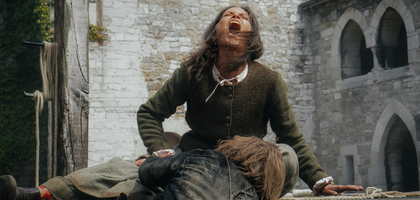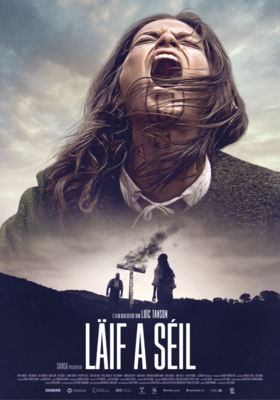Eye For Film >> Movies >> The Last Ashes (2023) Film Review
The Last Ashes
Reviewed by: Jennie Kermode

Located in the middle of Europe, surrounded by more powerful neighbours, the area now known as Luxembourg has been passed back and forth from one empire to another over the centuries. Its powerful families survived by doing three things: making strategic marriages with other influential houses across the continent; being quick to cooperate with each successive conqueror; and controlling the peasants over whom they had dominion so effectively that it made sense to leave them in place. For their part, the peasants were often grateful to be spared the massacres which happened elsewhere; but of course, they had no protection from masters who became abusive.
Set in Oesling, the northern part of the country where the living has always been harder, Loïc Tanson’s film is set in a village whose master is so cruel that young girls wear masks to hide their beauty, for fear of catching his eye. His family is referred to as the Graffs, but as that means something equivalent to ‘Count’, it’s unclear whether it’s really a name or just a title. One day, 12-year-old Hélène comes to his attention when she spots a starving family who have entered the area looking for food. Though she has tried to do her duty, she is horrified when he demands that they give him their eldest daughter, Marie, in exchange for their lives. His response to her outcry is still worse, and she is subsequently dragged out of the village and left for dead.

Flash forward 15 years and the country is starting to look quite different, with railway construction underway and social attitudes also changing. in the village, however, life remains just as it was. When a stranger arrives on its borders, demonstrating remarkable fighting skill and taking down one of the elder Graff’s senior henchmen, she is welcomed by desperate people willing to take a risk in the hope that it will bring about change. It’s obvious to viewers that this is the grown-up Hélène (now played by Sophie Mousel), but she is not quickly recognised as she has adopted a new name and has markings on her face associated with travelling people.
The film does not go into depth about where she has been or who has trained her, but it’s clear why she has come back. “You can’t kill them all,” she is told, but there’s no doubt that we’ll get to watch her try. Luxembourg’s entry for the 2024 Oscars, the film is clearly limited by a smaller budget than some of its competitors, but it makes its presence felt. That extraordinarily grim opening sets the stage well for what is essentially a western, though one which breaks with the conventions of the genre by way of having many scenes shot at night, indoors or hemmed in by trees. Much of its genre quality comes from Mousel, who brings real force to her role. There’s not a lot of room for nuanced acting, but she has the gritty charisma essential to tales of this type, as well as convincing at a physical level.
There are some complexities to the story, centred on Hélène ‘s interactions with the youngest adult member of the Graff family, who was once her ally, and with Marie, who has never forgotten her. These add an element of intrigue which in turn makes room for more exploration of the mechanics of the Graffs’ hold on power, and ensure that we never lose sight of the avenger’s formative influences.
With some memorable imagery, especially early on, the film is big on atmosphere, and compelling in its depiction of feudal anachronism surviving into the industrial age. It is not altogether successful in sustaining the pace towards the end, but there’s a lot to admire along the way.
Reviewed on: 16 Dec 2023
















